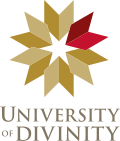University of Divinity
The University of Divinity is an Australian collegiate university of specialisation in divinity. It is constituted by eleven theological colleges from eight denominations. The University of Divinity is the direct successor of the second oldest degree-granting authority in the State of Victoria, the Melbourne College of Divinity. The university's chancery and administration are located in Kew, a suburb of Melbourne in the state of Victoria.
 | |
| Type | Theology |
|---|---|
| Established | 1910 |
| Chancellor | Graeme Blackman AO |
| Vice-Chancellor | Prof Peter Sherlock |
| Location | , Victoria , |
| Campus | Box Hill, East Melbourne, Mulgrave, Parkville, North Adelaide, Macquarie Park, Donvale |
| Website | divinity.edu.au |
The Melbourne College of Divinity was constituted in 1910 by an act of the Parliament of Victoria. The act was amended in 1956, 1972, 1979, 1990, 2005 and 2016 and is now known as the University of Divinity Act 1910 (previously the Melbourne College of Divinity Act 1910).[1] From its beginnings the college was a self-accrediting issuer of degrees, while not becoming a university until 2011. Representatives appointed by several churches formed the college to provide tertiary level theological education. The first president was the Right Reverend Henry Lowther Clarke, Anglican Archbishop of Melbourne, and the first registrar was the Reverend John Mathew, Moderator of the Presbyterian Church of Victoria.[2]
In 2010, the Melbourne College of Divinity applied to the Victorian Regulation and Qualifications Authority for approval to operate as an "Australian University of Specialisation". The Victorian government announced on 30 August 2011 that the application had been approved and on 1 January 2012 the college began operating as a university. Professor Peter Sherlock was appointed the inaugural Vice-Chancellor in April 2012.[3] In May 2019 TEQSA extended the seven year licence to operate as a university for an additional three years to the maximum possible of ten years before a review.
In the 2019 Student Experience Survey, the University of Divinity recorded the highest student satisfaction rating out of every Australian university, with an overall satisfaction rating of 92.8.[4][5]
Accreditations and affiliations
The University of Divinity offers awards in theology, philosophy, counselling and ministry.
In 2001 the institution was listed as a Schedule 1 Higher Education Institution by the Australian Government Department of Education, Science and Training. It receives federal funding for research, Australian Postgraduate Research Awards and International Postgraduate Research Scholarships.
The Higher Education Support Act (2003) (HESA 2003) listed the institution as a Table B (Private, Self-regulating) Higher Education Provider, which allowed its students to access federally funded loans under the FEE-HELP scheme.
The University of Divinity is the only Australian University of Specialisation listed on the National Register of Higher Education Providers maintained by TEQSA.[6]
Publications
- Pacifica, an academic journal (1988-2017)
Colleges
The colleges of the University of Divinity are:[7]
- Australian Lutheran College, Adelaide, South Australia
- Eva Burrows College, in Parkville, Victoria; Sydney and Central Coast, New South Wales. Training college of the Salvation Army in Australia
- Catholic Theological College, East Melbourne, Victoria. A federation of autonomous seminaries:
- Corpus Christi College
- St Mary's Seminary
- Salesian Theological College
- St Joseph of Cupertino Friary (Conventual Franciscan)
- St Dominic's Priory (Dominican)
- Morling College, Macquarie Park, New South Wales. The Baptist theological college of New South Wales.
- Pilgrim Theological College, Uniting Church[8]
- St Athanasius College, Donvale and Melbourne, Victoria
- Jesuit College of Spirituality, Parkville, Victoria
- Stirling Theological College, Mulgrave, Victoria. The Churches of Christ national theological college.
- Trinity College Theological School[8] (Anglican)
- Whitley College, Parkville, Victoria. The Baptist theological college of Victoria.
- Yarra Theological Union, Box Hill, Victoria. Comprises the following religious institutes:
- Blessed Sacrament Congregation
- Divine Word Missionaries
- Discalced Carmelites
- Franciscans (OFM)
- Missionaries of the Sacred Heart
- Pallottines, the Passionists
- Redemptorists
Until December 2014, the United Faculty of Theology, Parkville. Victoria. A co-operative venture of the Anglican, Jesuit and Uniting theological colleges.[8]
Associated churches
In 1910
Present
- Anglican
- Baptist
- Churches of Christ
- Coptic Orthodox
- Lutheran
- Roman Catholic
- Salvation Army
- Uniting Church in Australia
References
- University of Divinity Act 1910, section 35. http://www8.austlii.edu.au/cgi-bin/viewdb/au/legis/vic/consol_act/uoda1910296/ or https://divinity.edu.au/documents/university-act/
- "University of Divinity: History".
- Ross, John (13 January 2012). "MCD achieves specialist uni status", The Australian.
- "2019 Student Experience Survey" (PDF). Retrieved 19 June 2020.
- Baker, Jordan. "UNSW students least satisfied in the country, survey shows". The Sydney Morning Herald. Fairfax Media. Retrieved 19 June 2020.
- http://www.teqsa.gov.au/national-register/provider/prv12135
- https://divinity.edu.au/#ez-home-colleges
- UFT to close at end of 2014: Two New Colleges Approved for 2015 by University of Divinity
External links
- Official website
- Australian Lutheran College
- Eva Burrows College
- Catholic Theological College
- Morling College
- Pilgrim Theological College
- Jesuit College of Spirituality
- St Athanasius College
- Stirling Theological College
- Whitley College: the Baptist College of Victoria
- Yarra Theological Union
- Pacifica
- University of Divinity Act 1910